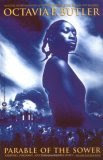
A couple of weeks ago I finished Octavia E. Butler's Parable of the Sower (1993) and instantly wished this had been the Oprah's Book Club pick over Cormac McCarthy's The Road (2006). Here are a few reasons why:
Both novels are dystopias of sorts, depicting the horrors of post-apocalyptic America in McCarthy's case, rampant lawlessness in California in Butler's. Both novels are bleak, powerful, and well-written. But Parable of the Sower resonated with me much more than did The Road.
Part of this could be the style of writing employed by the writers. McCarthy's sometimes poetic, sometimes sparse, "muscular" prose is about as far away as you can get from Butler's – a very descriptive, richly detailed first-person narrative (the young protagonist Lauren Olimina's journal entries) that flows without distraction. McCarthy's word choices and savage poetic style screamed out to me, "This is a fantasy." (Ironically, The Road feels more like a parable than Parable of the Sower.) With Butler, I almost believed I was reading actual events.
It makes little difference to me, but you could legitimately call both novels science fiction. In McCarthy's case, the sf element has happened before the story ever starts. You could say the same about Butler's novel, but Lauren's hyperempathy (the ability to feel the pain and sensations of other people) runs throughout the novel from start to finish. The sustained sf element might not have been such a hit with the Oprah crowd, but it's not so In-Your-Face that anyone's going to be offended.
Maybe what bothered me was plot (or lack of it). Butler sees a world spinning out of control. McCarthy's world is already there; there's not much further down things can go, not much guesswork. Butler's Lauren realizes that the only way to survive the darkness of the human soul is to embrace change. Change becomes the basis of her new religion, Earthseed, with its mantra "God is change," a worldview that could have significant consequences for every character in the book. The father and son in The Road are simply trying to survive on their own. Of course Butler's novel with its many characters provides much more opportunity for drama, horror, conflict, decisions and consequences. You're not really sure what's going to happen, who's going to live, who's going to die. Not so many choices with McCarthy.
Maybe I just liked Parable of the Sower better. It's a great story but it's also something larger. I learned and reflected more on what it means to be human and inhuman after reading Butler's novel than McCarthy's. But to his credit, McCarthy's novel seems to show more tenderness (maybe too much at times) between its two main characters than does Butler's. Perhaps that's why Oprah picked The Road. But I wish she'd read Parable of the Sower first.
4 comments:
Yeah, but if she recommends Sower, Orpah unfortunately can't have Octavia Butler on her show to talk, so why even bother, right? I guess that didn't stop her from recommending Steinbeck, but what was that about anyway? You'd think, though, that Oprah would have a vested interest in promoting fiction from women, especially black women. That's just one of the many things that irk me about Oprah. Not that she cares.
I loved Wild Seed, so I'll definitely check out Sower.
Butler was by all accounts such a private person I doubt she would have appeared on the show anyway. But that's no reason not to give attention to a great, deserving writer. I wonder if Oprah's even heard of her?
Parable is definitely good, often striking, but I'm not sure it entirely works. I'm going to post more on this on my site in a second, but do you consider this book YA? I ask because I haven't read much YA, but it seems suitable for that audience--almost more suitable for that audience in fact.
No, I don't consider it YA. I think there's probably too much sex (although there's certainly more graphic sex in some YA these days) and horrific stuff in it to be YA.
Which presents the novel's major problem: Lauren just isn't a believable teen. She's by far the most together, level-headed, thinking-two-jumps-ahead person in the novel displaying leadership skills way past her age. Even in a society such as this where you have to grow up quickly, teenagers are still teenagers and one who can handle situations like she can - much less come up with her own systematic religion - is really too much.
Some readers can obviously get past that. And although I like the novel a lot, I still think it's a huge stumbling block.
Post a Comment